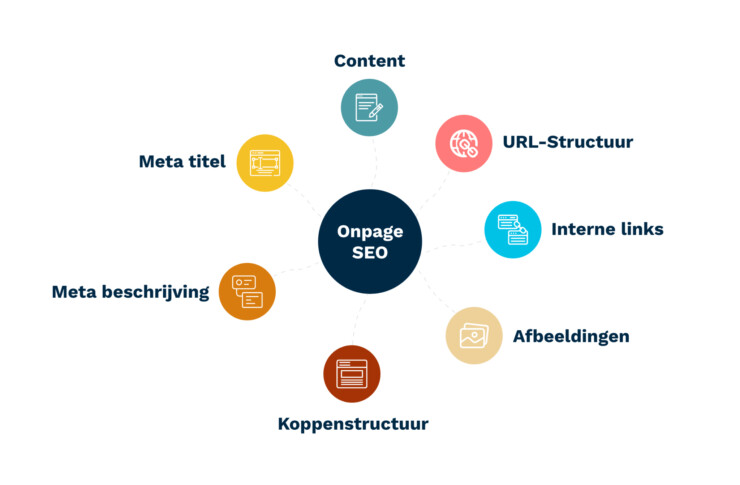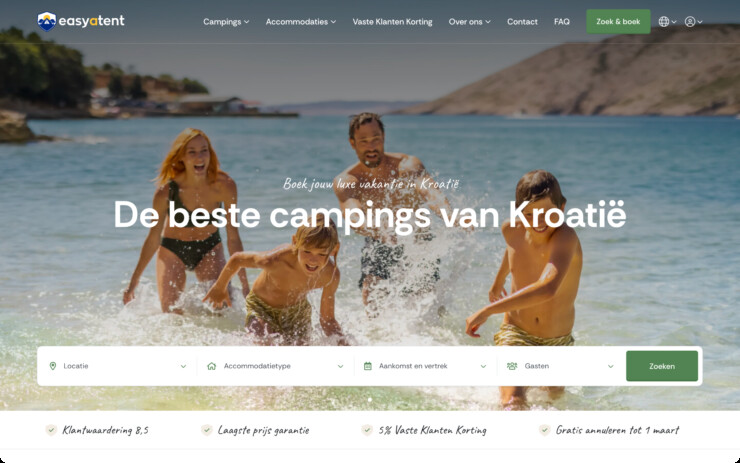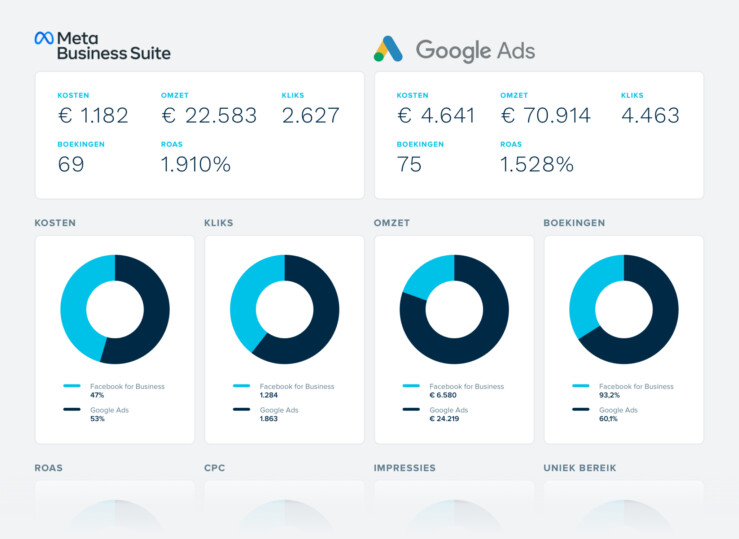Improve the visibility of your recreation business
Landing pages are crucial for the success of your camping, holiday park, rental organization, B&B, or hotel website. A well-written landing page not only attracts visitors but also ensures they stay and take action. This could include booking a stay, requesting information, or downloading a brochure from your rental organization. But how do you ensure your landing page is attractive to both potential guests and search engines like Google? In this blog, we discuss the key tips and techniques for writing effective landing pages for your camping, holiday park, or rental organization.
1. Understand your potential guest audience and define the page’s goal
Before you start writing, it’s important to be clear about who your audience is and what you want to achieve with the landing page.
- What is your audience looking for? What do they need? What questions do they want answered?
- What do you want them to do? For example, make a booking, contact you, or sign up for a newsletter.
A landing page (for your rental organization) must align with the search intent of your audience. Use simple, clear language and address the reader directly. Do you want your rental website to rank for a specific keyword? Make sure you optimize your page fully for that keyword.
Create a separate landing page for each topic you want to be found for. For example, if you have a campsite in the Veluwe that welcomes both families and camper van guests, you could create two separate, SEO-optimized landing pages:
- One page focused on “family camping,” with content tailored to families, such as playgrounds, child-friendly facilities, and family activities.
- Another page focused on “camper pitches in the Veluwe,” with information on camper facilities, spacious pitches, and convenient amenities.
Each audience searches differently, and by adapting your landing pages accordingly, you increase your chances of ranking higher in search results.
2. Structure: Make the page "scannable"
Visitors on the internet don’t read everything; they scan. Therefore, ensure your page has a clear and organized layout.
How to make a page scannable?
- Ensure each section has a clear heading (H1, H2, H3). Use short paragraphs: 3 to 5 lines per paragraph is ideal.
- Clear (sub)headings: Use headings that directly describe the content of the paragraph or section.
- Lists and bullet points: Bullet points catch attention and are easy to read.
- White space: Keep your page light and organized by leaving enough white space between text and images.
- Add visual elements, such as icons or charts, to support the text.
3. Choose the right keywords to be more findable (SEO)
To make your holiday park, campsite or rental organisation more findable online, it is important to know what your (potential) guest is searching for. This means researching the right keywords.
Where to place keywords on a landing page?
- Meta title and meta description: These are the first things a visitor sees in the search results. Make sure your keyword is included here.
- URL: Use a short and clear URL with your keyword.
- H1 heading: Use the main keyword in the title of the page.
- First paragraph: Incorporate the keyword as early as possible in your text, but keep it natural.
- Subheadings (H2, H3): Use keywords in subheadings to clarify the structure.
- Image alt texts: Add keywords to the descriptions of your images and ensure the file names also contain your keywords.
- In addition to your primary keyword, also use synonyms and related terms (LSI). This makes your text sound more natural and helps with broader search visibility. AI can assist you with this.

4. Write attractive and converting texts that generate bookings
The text on your landing page should convince a potential guest to take action, for example, book a holiday with you. You achieve this by:
- Clearly state the benefits: Why should the visitor choose you?
- Put the visitors at the center: Write from the reader's perspective, not from your company's. Use "you" and "your" instead of "we."
- A Call-to-Action (CTA): Actively guide visitors with a clear call to action, such as "Book now," "Request a quote," or "Check out our packages."
5. Optimize for both search engines and users
Google looks at much more than just keywords. Quality and user experience also play a significant role.
Key optimizations:
- Mobile-friendliness: More than 50% of visitors come via a mobile device. Ensure your landing page loads quickly and is easy to read on smartphones.
- Core Web Vitals: Google measures factors such as page load speed and interactions. Make sure these are optimized.
- Internal and external links: Link to other relevant pages on your website (such as related services) and to reliable external sources.
6. Use visual elements
People are strongly attracted to visual content, and this applies to landing pages as well. Use images and videos to enhance your text and inspire visitors.
Visual elements that work:
- High-quality images: Think of photos of your location, accommodations, or activities.
- Videos: A short tour of your location or an introduction to your team.
- Infographics: Simple and visual representation of key information, such as steps in the booking process.
Practical tips:
- Give each image a clear name and alt tag that includes your keyword.
- Ensure your images are compressed to minimize loading time.

7. Analyze and improve
A landing page is never “finished.” Analyze the performance of your page and improve where necessary—measuring = knowing. Make sure you make your results visible yourself or get help from Recranet’s marketers.
What can you measure?
- Conversions: How many visitors take the desired action?
- E-commerce tracking: Where do your bookings come from? Recranet’s total solution provides detailed and accurate insights into the results of your online marketing campaigns. The question “What is my online marketing generating?” is now a thing of the past.
- Bounce rate: How many visitors leave the page without doing anything?
- Page speed: A slow page can deter visitors. Does your page rank for the right keywords? It’s essential to continuously measure if your keywords are performing better, especially after ongoing organic SEO optimizations. Monitoring the ranking of your page helps understand which keywords are performing well and which might need extra attention. Use tools like Google Analytics and Google Search Console to get insights into your keyword performance. These tools provide valuable data on traffic, search queries, and page performance. To further optimize your keyword performance, you can also use tools like SE Ranking. It provides detailed analysis of your keyword positions, competition, and growth, helping you better measure and adjust your SEO strategies.
